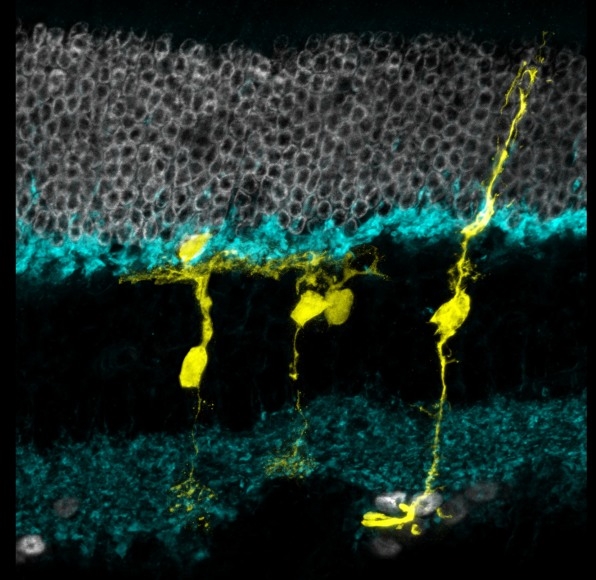Retinas, the image sensors of the eye, don’t heal after damage from an injury or a genetic disease—at least not in mammals like humans. But the retinas in some fish do regenerate. Today, researchers at the University of Washington in Seattle reported that they have hacked the cells of a mouse retina to act like those of a fish—not only growing new neurons, but also wiring those neurons up to other neurons that send signals to the brain.
This is a major step, though far from the last, toward restoring sight in people who have lost it due to retina damage from genetic diseases like retinitis pigmentosa, age-related diseases like macular degeneration, or side effects of diseases like diabetes. Retina damage isn’t the biggest causes of blindness. That would be cataracts, which affect the eye’s lens. But cataracts are curable with routine surgery. Retina damage is incurable.

That is, unless you’re a fish. The eyes of the zebrafish, in particular, have an uncanny knack for regenerating, and now scientists know how that process happens: A type of cell called Müller glia, which provides support services to the neurons, can also transform itself to stand in for a neuron that’s been lost. Humans and other mammals also have Müller glia, but the part of their DNA that would reprogram them to become neurons is locked away.
Instead of trying to engineer a new drug that might unlock that DNA, the UW researchers pored through catalogs of existing drugs that might do the trick. They found one called Trichostatin-A (TSA), a hormonal treatment for breast cancer, that also happens to open up the regeneration DNA sequence. In an injured retina, these Müller glia cells treated with TSA transformed into two types of neurons, bipolar and amacrine cells, that are part of the retina’s internal wiring.
But the UW researchers haven’t yet produced the most important neurons: the photoreceptors that actually convert light into a signal for the brain. Other researchers have generated new photoreceptors from types of cells other than Müller glia, but they haven’t wired up to other neurons. The UW researchers expect their method could someday make not only photoreceptors, but ones that connect to the brain. That will be a bright day, indeed.
Using an anticancer drug, researchers have grown new neurons in the retinas of mice–a big step toward curing many forms of blindness in humans.
Retinas, the image sensors of the eye, don’t heal after damage from an injury or a genetic disease—at least not in mammals like humans. But the retinas in some fish do regenerate. Today, researchers at the University of Washington in Seattle reported that they have hacked the cells of a mouse retina to act like those of a fish—not only growing new neurons, but also wiring those neurons up to other neurons that send signals to the brain.
Fast Company , Read Full Story
(68)